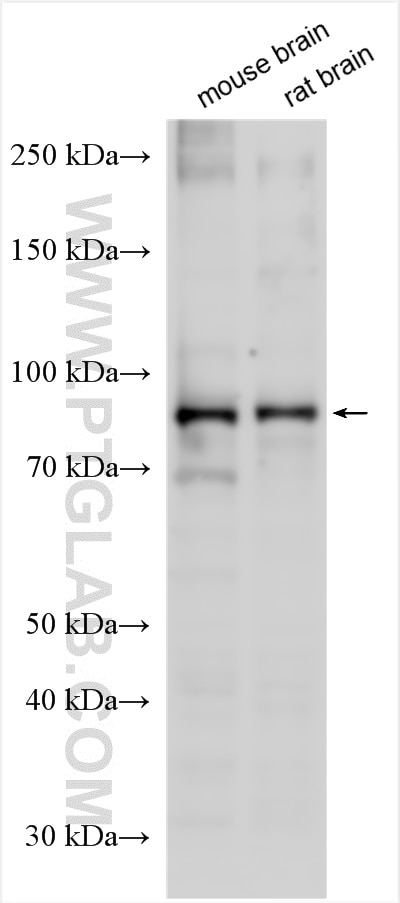Tested Applications
| Positive WB detected in | mouse brain tissue, rat brain tissue |
Recommended dilution
| Application | Dilution |
|---|---|
| Western Blot (WB) | WB : 1:500-1:2000 |
| It is recommended that this reagent should be titrated in each testing system to obtain optimal results. | |
| Sample-dependent, Check data in validation data gallery. | |
Product Information
24580-1-AP targets KCNQ3 in WB, ELISA applications and shows reactivity with human, mouse, rat samples.
| Tested Reactivity | human, mouse, rat |
| Host / Isotype | Rabbit / IgG |
| Class | Polyclonal |
| Type | Antibody |
| Immunogen |
CatNo: Ag20147 Product name: Recombinant human KCNQ3 protein Source: e coli.-derived, PET28a Tag: 6*His Domain: 379-517 aa of BC128576 Sequence: PNRIDLVATWRFYESVVSFPFFRKEQLEAASSQKLGLLDRVRLSNPRGSNTKGKLFTPLNVDAIEESPSKEPKPVGLNNKERFRTAFRMKAYAFWQSSEDAGTGDPMAEDRGYGNDFPIEDMIPTLKAAIRAVRILQFR Predict reactive species |
| Full Name | potassium voltage-gated channel, KQT-like subfamily, member 3 |
| Calculated Molecular Weight | 872 aa, 97 kDa |
| Observed Molecular Weight | ~90 kDa |
| GenBank Accession Number | BC128576 |
| Gene Symbol | KCNQ3 |
| Gene ID (NCBI) | 3786 |
| RRID | AB_3085739 |
| Conjugate | Unconjugated |
| Form | Liquid |
| Purification Method | Antigen affinity purification |
| UNIPROT ID | O43525 |
| Storage Buffer | PBS with 0.02% sodium azide and 50% glycerol, pH 7.3. |
| Storage Conditions | Store at -20°C. Stable for one year after shipment. Aliquoting is unnecessary for -20oC storage. 20ul sizes contain 0.1% BSA. |
Background Information
KCNQ3, also named as BFNC2, EBN2 and KV7.3, belongs to the potassium channel family and KQT subfamily. KCNQ3 is probably important in the regulation of neuronal excitability. Associates with KCNQ2 or KCNQ5, KCNQ3 forms a potassium channel with essentially identical properties to the channel underlying the native M-current, a slowly activating and deactivating potassium conductance which plays a critical role in determining the subthreshold electrical excitability of neurons as well as the responsiveness to synaptic inputs. Defects in KCNQ3 are the cause of benign neonatal epilepsy type 2 (EBN2).
Protocols
| Product Specific Protocols | |
|---|---|
| WB protocol for KCNQ3 antibody 24580-1-AP | Download protocol |
| Standard Protocols | |
|---|---|
| Click here to view our Standard Protocols |




